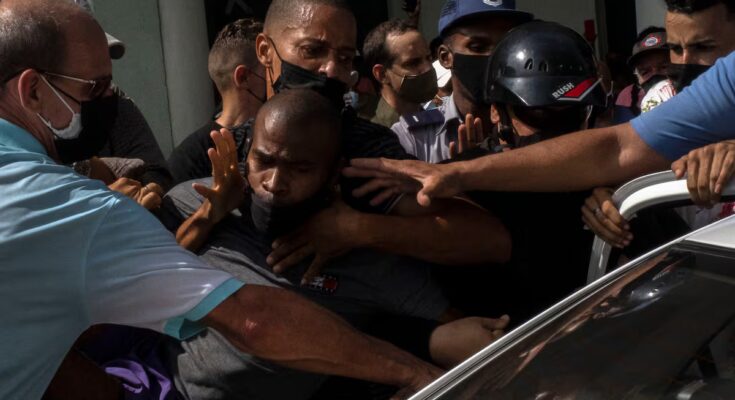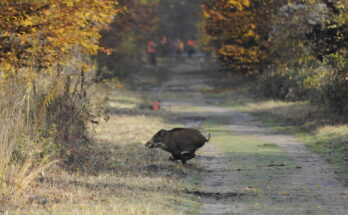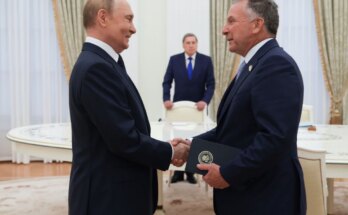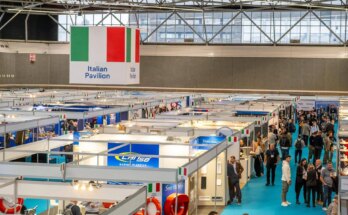The United Nations Working Group on Arbitrary Detention (WGAD) concluded that 49 participants in the unprecedented protests that took place in Cuba on 11 July 2021 – which automatically made them political prisoners – suffered arbitrary detention, enforced disappearances, unfair trials and convictions, torture, isolation and discrimination on political and religious grounds.
Four years after the demonstration that led to the imprisonment of more than 1,500 people, Cubans and international organizations continue to demand justice. “It has been a long road, but every right belief is positive, however small it may represent the reality that Cubans live,” Javier Larrondo, director of Prisoners Defenders, the NGO that documented and presented the cases to the Working Group, told EL PAÍS.
The UN body’s findings, presented during its 103rd session, show that some of the detainees were not informed of the reasons for their arrest, were not issued arrest warrants and were not informed of their legal rights. They also show that detainees were not brought before a judge to challenge their detention within 48 hours of their initial arrest and that some, after arrest, were held incommunicado for several days and weeks, without being allowed to contact their families. Furthermore, several detainees did not have access to a lawyer or were not brought before a judge “to ensure the legality of the proceedings”.
“Given the context in which these arrests occurred, the cases described in the communication demonstrate a systematic violation of multiple rights set out in the Universal Declaration of Human Rights, in particular Article 18, which guarantees freedom of thought, conscience and religion,” the Working Group determined. He also insisted that criminal charges against protesters “are intended to coerce them for their views and political participation, as well as to discourage further protests in this area.”
Prisoners Defenders, together with a team of more than 10 lawyers, takes on the task of collecting and analyzing thousands of documents related to the cases of 520 prisoners, out of a total of more than 1,180 political prisoners in Cuba. “However, the limited resources and regulations of the Working Group made it difficult to address all cases and required us to proceed in phases. Therefore, of these 520 cases, 17 were addressed in 2024 and 49 in 2025,” explains Larrondo. “For a dictatorial regime, it is very easy to detain, disappear, imprison and torture thousands of people. Proving the innocence of each of them is a herculean task. The UN Working Group has demonstrated its high level of professionalism in its mission, despite having barely enough resources to deal with thousands, even a small fraction, of the cases that occur every year in Cuba.”
The WGAD’s findings place Cuba as the first country in the world in the number of convictions for arbitrary detention since 2019, making it a “historic conviction” by the UN, according to Larrondo. “These indicators are important to ensure that the debate on Cuba in Europe and in the democratic world is fair. We must abandon fantasies; Cuba is not a left-wing regime, it is a totalitarian, criminal and fascist dictatorship,” he argues.
The United Nations body not only declared the actions of the Cuban government “illegal”, as widely denounced by activists, independent media and the families and detainees themselves; It also urged the Havana government to release and compensate the 49 political prisoners whose cases were examined and to grant them “other forms of reparation, in accordance with international law.” He also urged the Cuban government to conduct a “thorough and independent” investigation into the cases presented and to “take appropriate measures against those responsible for the violation of their rights.”
On March 7, 2015, the Working Group communicated its accusations to the Cuban government and requested a response by May 6, requesting detailed information on the situation of some detainees. However, to date, Havana has not sent “any response within the allotted deadline, nor has it asked for an extension.” “The Working Group regrets that the government did not respond to its request within the expected timeframe,” the organization said. Larrondo, for his part, insists that prisoner advocates will continue to speak out against abuses, regardless of whether or not “politicians act to stop the massacre of freedoms taking place in Cuba.”
Sign up to our weekly newsletter to get more English-language news coverage from EL PAÍS USA Edition



